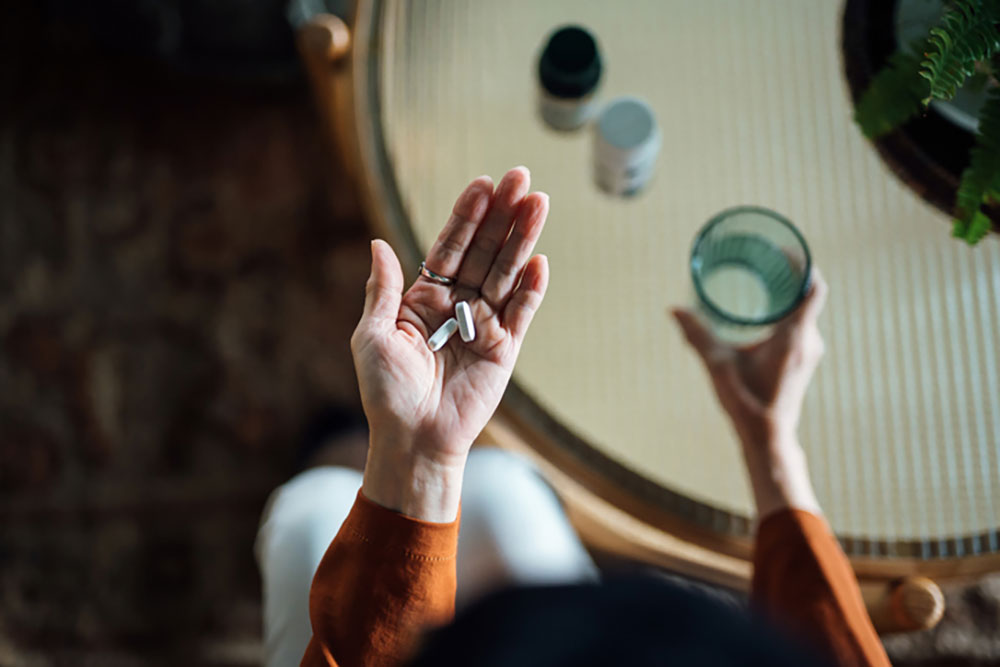
iStock
By Mary Carpenter
“YOU should consider taking a vitamin supplement” was advice I heard for the first time this spring from my internist—who had previously contended that diet could provide all the vitamins needed for good health. But new research supports the need for supplements, notably vitamin B12, she said; and other recent evidence also suggests taking added B3 and D.
The “common cause of B12 deficiency, especially in older people, is a lack of stomach acid, because stomach acid is needed to liberate vitamin B12 from food,” according to Harvard’s Nutrition Source newsletter. “An estimated 10-30% of adults over the age of 50 have difficulty absorbing vitamin B12 from food.” In addition, anyone taking antacids or other stomach acid suppressors for conditions such as GERD might need additional B12, although research has not shown increased prevalence of a deficiency in people taking these medications.
Low levels of B12, even without official “deficiency,” can contribute to brain fog, fatigue and weaker bone health—and extend to more serious complaints, including memory loss and pain. According to webmd, “When you’re in your 60s you should officially start getting blood tests to test for vitamin B12 deficiency. Around this age, you should be getting around 2.4 micrograms of B12 a day.”
Vitamin B3 is another recently recommended supplement, with evidence that it can improve energy metabolism in the brain that decreases with age—possibly contributing to cognitive changes associated with diseases such as Alzheimer’s (AD). Explained Delaware Center for Cognitive Aging Research director Christopher Martens: “If the brain cells can’t produce the energy they need to be able to function, then they can’t signal, and if nerve cells in the brain can’t signal effectively then cognition will be affected. Whether this is a cause of the disease or a symptom is unclear.”
Supplements of B3 in the form of nicotinamide riboside led to a “significant decrease in the levels of amyloid beta protein in neurons” associated with AD—compared to the effects in a placebo group — in research by Martens and his team. The brain converts B3 to the molecule NAD+—which is involved in creation of energy by the cells, and is also taken as an independent supplement.
“NAD+ can directly and indirectly influence many key cellular functions, including metabolic pathways, DNA repair, chromatin remodeling, cellular senescence and immune cell function,” according to Anthony Covarrubias and colleagues at UCSF. “These cellular processes and functions are critical for maintaining tissue and metabolic homeostasis and for healthy ageing.”
For vitamin D, the advice keeps changing, but evidence for upping daily intake appears stronger with every passing year —as does evidence for its many health benefits: roles in maintaining bone health as well as in disorders that include cancer, diabetes and depression. The body’s ability to synthesize vitamin D from sunshine, which is lower in those with darker skin, declines with age. From the same sun exposure, a 70-year-old may produce as little as one-quarter as much D as a 20-year-old; and more than three-quarters of hip-fracture patients have vitamin D deficiency.
Vitamin D deficiency rates in the U.S. are rising, with the most vulnerable living above the 40-degree latitude north of the equator (north of Philadelphia or Denver), where getting adequate levels from the sun, the best vitamin D source, becomes more difficult. Blood tests for vitamin D should be done in late winter to assess an individual’s lowest levels.
Vitamin D can act as both a vitamin and a hormone—with the general distinction that vitamins cannot be synthesized by the body, with exceptions such as D, and mainly affect metabolism; while hormones like estrogen and insulin are produced in the body and have primary roles in growth and development. Kaiser Permanente dermatologist and hair growth specialist Paradi Mirmirani told the New York Times: “We know that vitamin D acts more like a hormone in the hair [affecting changes in growth following menopause] than a vitamin.”
Diet may also need to change to ensure adequate vitamin intake—especially with age and even with the addition of supplements. “The only reliable food sources for B12 are animal products,” according to webmd. Though “vitamin B12 rich foods” include fortified cereals, primary sources most often listed are eggs, cheese, milk, trout, haddock, salmon, beef liver and cooked clams. Some foods, however, that are touted to contain high levels of B12 may in fact have little or none, for example: Brewer’s yeast—which only contains B12 if specifically fortified; and Nori, dried edible seaweed—because the amount of B12 varies so much among types of seaweed, with some containing none.
While I try not to believe too much in lucky signs, I received my doctor’s supplement advice only a week after a friend brought over two large containers of multivitamins for women over 50 (Centrum), saying she had discovered after buying the pills that they contained iron and had caused constipation—something I also wanted to avoid, but had no problem with these and now had a good supply to get me started.
—Mary Carpenter regularly reports on topical subjects in health and medicine.

Nicotinimide has been shown in an Australian study to help prevent early skin cancers. With limited research I see that nicotinimide riboside is different and I wonder whether it has the same anti-cancer effect as plain nicotinamide.